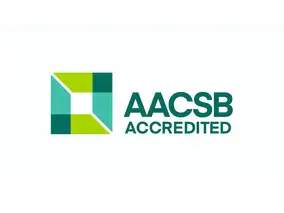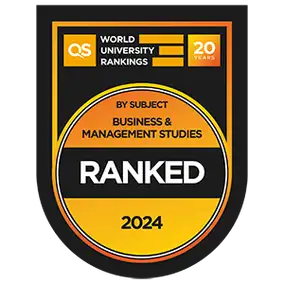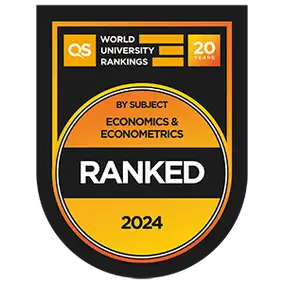Where you can study
International students
International students are not New Zealand citizens or residents.
Specialise in Economics for your Master of Business Studies at Massey
Massey University’s Master of Business Studies combines study of advanced theory with research. It gives you the skills you need to progress your career, or continue to further study.
What will you learn?
A master’s is a rigorous, challenging, rewarding and exciting qualification. Your study will focus on your chosen specialisation, in the context of other business disciplines. This reflects the reality of today’s business environment.
You will learn the processes and disciplines involved in high-level in-depth research and how to apply them to business. You will complete and present a comprehensive written report on an independent research topic.
We have strong relationships with industry. We will help you draw on experience you may have to give your learning context and relevance to the real world.
The Master of Business Studies will also develop your oral and written communication skills to the level expected of senior business leaders.
Further study
After completing a Master of Business Studies, you could go on to a PhD.
A Master of Business Studies in Economics is a good fit if you:
- have completed a bachelor’s degree (or bachelor’s degree with honours) in business or related discipline with good grades
- are interested in a postgraduate qualification with a research component
- wish to progress your career or would like to continue on to a PhD.
Planning information
If you study full-time, you’ll take 120 credits per year or 60 credits per semester.
Grades achieved in the first 60 credits will determine eligibility for progression to Part Two. You will need to achieve a minimum B- grade average over the first 60 credits of Part One including the compulsory courses.
Official regulations
To understand what you need to study and must complete to graduate read the official rules and regulations for this qualification.
You should read these together with all other relevant Statutes and Regulations of the University including the General Regulations for Postgraduate Degrees, Postgraduate Diplomas, and Postgraduate Certificates.
Returning students
For returning students, there may be changes to the majors and minors available and the courses you need to take. Go to the section called ‘Transitional Provisions’ in the Regulations to find out more.
In some cases the qualification or specialisation you enrolled in may no longer be taking new enrolments, so may not appear on these web pages. To find information on the regulations for these qualifications go to the Massey University Calendar.
Please contact us through the Get advice button on this page if you have any questions.
Courses you can enrol in
Course planning key
- Prerequisites
- Courses that need to be completed before moving onto a course at the next level. For example, a lot of 200-level courses have 100-level prerequisite courses.
- Corequisites
- Courses that must be completed at the same time as another course are known as corequisite courses.
- Restrictions
- Some courses are restricted against each other because their content is similar. This means you can only choose one of the offered courses to study and credit to your qualification.
Core courses for the Master of Business Studies
As well as the specialisation courses listed below, this qualification has core courses that you will need to complete.
Master of Business Studies core courses
Economics courses
Part One
An approved 700-level Research Methods course
Subject courses
Course code: 178703 The Theory and Practice of Economics 30 credits
This course is a survey of developments in macroeconomic and microeconomic theory with extension into contemporary issues and practice.
View full course detailsCourse code: 178712 International Monetary Economics 30 credits
This course is concerned with the monetary and macroeconomic relationships between countries. It deals with such issues as balance-of-payments problems and policies, the functioning of foreign exchange rate markets, the determination and causes of exchange-rate movements, the international monetary system, and derivative instruments including swaps, options and futures.
View full course detailsCourse code: 178718 Health Economics 30 credits
Subject areas to be covered include microeconomics for healthcare, the economics of politics and bureaus, demand for healthcare, the supply and organisation of healthcare, hospital behaviour, moral hazard, cost-benefit analysis in health, private versus public provision of healthcare and contemporary policy issues.
View full course detailsCourse code: 178719 Climate Change Economics and Policy 30 credits
An analysis of the economics of climate change and evaluation of the mitigation options used by policy makers globally.
View full course detailsCourse code: 178732 Advanced Econometrics 30 credits
This course introduces students to advanced methods used in econometrics and forecasting. Topics include time-series analysis; testing and model selection; simultaneous equations; nonstationarity; vector autoregressive models; causality and exogeneity; binary choice models and panel data analysis.
View full course detailsCourse code: 178755 Economic Growth, International and Development Economics 30 credits
A critical assessment of topics from economic growth, international economics and the nature and measurement of development. There is an emphasis on the empirical and policy implications of development strategies including the relationship between managing development, role of the State, international economy, globalisation, trade theory and policy, global crises, and macroeconomic policy.
View full course detailsPart Two
Course code: 115891 Thesis 90-Credit Part 1 45 credits
Candidates are required to conduct a piece of independent research under supervision and to produce a thesis for examination.
View full course detailsCourse code: 115892 Thesis 90-Credit Part 2 45 credits
Candidates are required to conduct a piece of independent research under supervision and to produce a thesis for examination.
View full course detailsCourse code: 115894 Research Report 60-Credit Part 1 30 credits
Candidates are required to conduct a piece of independent research under supervision and to produce a report of the research for examination.
View full course detailsCourse code: 115895 Research Report 60-Credit Part 2 30 credits
Candidates are required to conduct a piece of independent research under supervision and to produce a report of the research for examination.
View full course detailsCourse code: 178894 Research Report 60 credits
Candidates are required to conduct a piece of independent research under supervision and to produce a report of the research for examination.
View full course detailsCourse code: 178897 Thesis 120 Credit Part 1 60 credits
A supervised and guided independent study resulting in a published work.
View full course detailsCourse code: 178898 Thesis 120 Credit Part 2 60 credits
A supervised and guided independent study resulting in a published work.
View full course detailsCourse code: 178899 Thesis 120 credits
A supervised and guided independent study resulting in a published work.
View full course detailsEntry requirements
Admission to Massey
All students must meet university entrance requirements to be admitted to the University.
Specific requirements
To enter the Master of Business Studies (Economics) you will have been awarded or qualified for a relevant bachelor’s degree or equivalent qualification, with a minimum B- grade average in the highest level courses.
If you have been awarded the Degree of Bachelor of Business Studies with Honours from Massey University, or the equivalent degree of another recognised university, you may apply for credit towards Part One of the qualification.
You will need to provide copies of all official academic transcripts for studies taken at all universities other than Massey University.
English language requirements
To study this qualification you must meet Massey University's English language standards.
English language skills
If you need help with your English language skills before you start university, see our English for Academic Purposes (EAP) courses.
Fees and scholarships
Fees, student loans and free fees scheme
Your tuition fees may be different depending on the courses you choose. Your exact fees will show once you have chosen your courses.
There will also be some compulsory non-tuition fees and for some courses, there may also be charges for things such as study resources, software, trips and contact workshops.
- Get an estimate of the tuition fees for your qualification
- View a list of non-tuition fees that may be payable
Already know which courses you're going to choose?
You can view fees for the courses that make up your qualification on the course details pages.
Student loans (StudyLink) and Fees Free scheme
You may be eligible for a student loan to help towards paying your fees.
The New Zealand Government offers fees-free tertiary study for eligible domestic students. Find out more about the scheme and your eligibility on the Fees Free website. To use the site's eligibility checking tool, you will need your National Student Number.
Current and returning Massey students can find their National Student Number in the student portal.
- Student loans (StudyLink)
- Fees Free
- Student portal
Scholarship and award opportunities
- Joe Walding Memorial Bursary
- Lovell and Berys Clark Scholarships
- Massey University Master's Research Scholarship
Fees disclaimer
This information is for estimation purposes only. Actual fees payable will be finalised on confirmation of enrolment. Unless otherwise stated, all fees shown are quoted in New Zealand dollars and include Goods and Services Tax, if any. Before relying on any information on these pages you should also read the University's Disclaimer Notice.
Careers and job opportunities
Business studies equips students with the flexible and highly portable skills employers are looking for. With a Master of Business Studies, you will be prepared to take the next step in your career. Or you could join the world of business in a variety of dynamic roles, from financial accountant to marketing manager.
Greater earning potential
A 2017 Ministry of Education publication The post-study earnings and destinations of young domestic graduates, found that in New Zealand:
- young master’s graduates earn more than one and a half times more than the national median (five years after study)
- earnings and employment rates increase with the level of qualification completed
- five years after completion, the median earnings of young master’s graduates are 15% higher than for those with a bachelor’s degree.
International students
New Zealand is a great place to study. Massey University’s reputation is supported by our international rankings, accreditations and associations. We are rated five star plus by the QS World University Rankings.
Massey University has small class sizes, and our lecturers and staff are friendly and approachable.
As an international student, there are entry requirements that will apply to you. We recommend that you apply at least three months before your anticipated start date so your application can be processed in time. There are additional steps you will need to take. These include obtaining a visa and travel bookings if your study is to be in New Zealand.
Accreditations and rankings

Association to Advance Collegiate Schools of Business (AACSB)
Massey Business School is rated in the top 5% of global business colleges by AACSB International.

QS Ranking - Business Management Studies
Massey University is ranked by QS (Quacquarelli Symonds) as one of the top 400 universities for business and management.

QS Ranking - Economics and Econometrics
Massey University is ranked by QS (Quacquarelli Symonds) as one of the top 350 universities for economics and econometrics.
Related study options
Diploma in Facilities Management – DipFM
Learn about operational maintenance and management of built facilities with Massey's Diploma in Facilities Management. This will open the way to a diverse and challenging career.
Economics – Bachelor of Business
The Bachelor of Business (Economics) is a versatile degree where you will learn how the world of business works, and gain the skills to interpret global information and events.
Economics – Bachelor of Arts (Honours)
With Massey’s Bachelor of Arts (Honours) (Economics) you can take your undergraduate study of economics further.
Economics – Bachelor of Arts
Succeed as a professional in the private, not-for-profit or public sector. Learn how the economy affects our everyday life, culture, and environment.
Economics – Diploma in Arts
Improve your economic decision-making skills and understanding with Massey’s Diploma in Arts (Economics).
Economics – Postgraduate Diploma in Arts
With Massey's Postgraduate Diploma in Arts (Economics) you’ll build on your undergraduate interests and further investigate topics in economics that have taken your interest.
Economics – Master of Arts
Open up a world of employment options. With Massey’s Master of Arts (Economics) you’ll build on your undergraduate interests and develop your analysis and research skills.
Economics – Graduate Diploma in Arts
The Graduate Diploma in Arts (Economics) will give you the equivalent of an undergraduate major in economics without having to complete a second bachelor’s degree.
Financial Economics – Master of Management
The Master of Management will increase your business knowledge to help move your career in a new direction. You don’t have to have a qualification in business to undertake this master’s.
Graduate Diploma in Facilities Management – GradDipFM
Build on your existing knowledge and skills in construction with Massey’s Graduate Diploma in Facilities Management. Learn how to organise, control and coordinate the strategic and operational management of facilities.
Useful planning information

Key information for students
Compare qualifications and academic information across different New Zealand institutions. Learn more on careers.govt.nz
